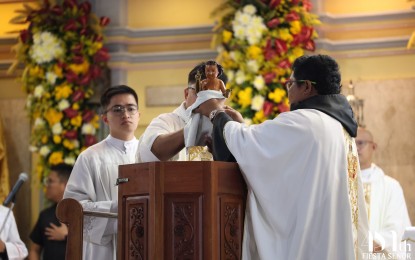
HUBO MASS. Priests of the Order of St. Augustine wipe the image of the Sr. Sto. Niño after the ritual bathing and dressing with new vestments and regalia to be worn the whole year until the next celebration. Father Jaime Silvestre Parmisado said in his homily on Friday (Jan. 26, 2024) that the "Hubo" ritual marks the conclusion of the Fiesta Señor 2024. (Photo courtesy of the Basilica Minore del Sto. Niño)
CEBU CITY – The Augustinian friars in the Basilica Minore del Sto. Niño on Friday officially ended the Fiesta Señor 2024 through the traditional “Hubo”, a ritual of undressing the image of the Holy Child before returning it to the house altar where it will stay until next year’s celebration.
Fr. Jaime Silvestre Parmisado, who led the Hubo Mass, said the traditional ritual of removing the Holy Child’s vestments and regalia is done every Friday following last Sunday’s celebration of the Sto. Niño fiesta.
“Let us once again promise through our gaze that we will do our best with His grace in our Christian journey. That in gazing our Lord who humbled Himself, that we strive to forgive and to ask to forgiveness,” the priest said in his homily.
The Basilica priests said every faithful devotee who attends the ritual of Hubo can gain a plenary indulgence.
In the list of indulgences granted in 1932 by the Cebu Bishop Gabriel Reyes it stated that those who go to confession and receive holy communion on Friday after the Fiesta, could gain a plenary indulgence.
The Hubo has its roots long since the acquisition of the image of Santo Niño by Queen Humamay or Juana, wife of Rajah Humabon, from the Spanish, and continued by the Augustinian priests.
“(The) ritual of bathing and undressing and redressing the image was done privately up until the 1990s when the practice was made public,” it said.
After the bathing is done, the image of the Sto. Niño was returned to the glass encasement and placed in a chapel where devotees can visit, kiss, and venerate. (PNA)
